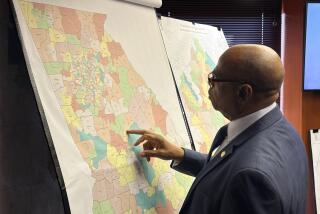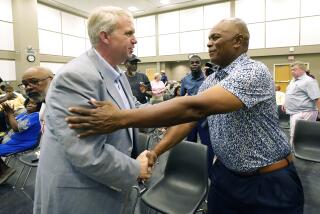Related story: In Georgia, a Senate race is central to Democrats’ hopes
MILLEDGEVILLE, Ga.— In an Atlanta hotel ballroom, Republican candidates vying for one of this year’s most competitive Senate seats sparred recently over who could best impress a mostly white, conservative-leaning audience.
Among the contenders: a gun rights advocate who made a national splash with plans to raffle an AR-15 rifle; a doctor who once agreed with the suggestion that pregnancy rarely results from rape; and a third who wanted poor students to sweep cafeteria floors to pay for their government-subsidized school lunches.
Noticeably absent was the leading Democratic candidate. Michelle Nunn, a political newcomer with a famous family name, skipped the event, happy to let her rivals tear into one another.
Seen as Democrats’ best hope to pick up a Senate seat in the midterm election, the daughter of former Georgia Sen. Sam Nunn is counting on her Republican opponents to alienate voters with their far-right platforms, as has occurred elsewhere in recent races.
But her campaign also hinges on whether she can take advantage of the Peach State’s rapidly changing demographics.
Once a Democratic stronghold, Georgia turned red over the last 20 years as white voters embraced Republican candidates. Fewer than 1 in 4 white Georgians voted for President Obama in 2008.
But a swift rise in Georgia’s African American and minority population is tilting the political landscape back.
Much rides on how far that tilt has gone. Democrats face strong Republican challengers in at least half a dozen Senate races — enough to potentially undo the Democratic majority in the chamber. That would leave Obama facing an entirely Republican-controlled Congress for the remaining two years of his term.
But if Nunn wins the seat here, where the incumbent Republican is retiring, Democratic hopes of holding on to the Senate would be significantly improved.
So the day after the Atlanta debate, Nunn, 47, headed to Georgia’s Civil War-era capital of Milledgeville, a picturesque place of white-columned buildings and country roads.
“This is exactly the table I want to be at,” the former nonprofit director told a group of mostly black seniors who were transforming an abandoned elementary school site into a community garden.
Later at a luncheon of tea sandwiches and homemade cheese straws — a traditional Georgia snack — Nunn tried to charm the moderate white voters that her team sees as equally vital to victory.
Her courting of this often-neglected voter bloc may prove to be smart.
An influx of African Americans moving from other states has made metropolitan Atlanta’s black population the nation’s second largest after New York, demographers say. New black families are snapping up roomy houses in suburbs that were once predominantly white and filling trendy restaurants downtown.
White voters, meanwhile, have shrunk from 75% of the electorate in 2000 to 61% in 2012. And the trend is expected to accelerate. About 59% of Georgians under age 1 are minorities, census figures show.
Outside Atlanta’s popular Sunday brunch spot Mary Mac Tea House, Robert Hawkins, an African American business owner, said the migration of blacks and other minorities was slowly loosening the dominance that GOP-leaning white voters have had in Georgia, creating an opening for Nunn.
“That influence that was here before, it’s kind of diluted,” he said. “The time is ripe for her.”
Still, Nunn faces an uphill battle to become Georgia’s first female senator. She needs to motivate black and minority voters to turn out at polls in the same historically high numbers Obama achieved, while not alienating suburban whites who trend Republican but might be willing to give a moderate Democrat a chance. A February poll put her neck-and-neck with the competition.
Hers is not the only Democratic brand in Georgia betting that changing demographics will help the party reverse its decline in the South. Jason Carter, the grandson of former President Carter, is vying to unseat Republican Gov. Nathan Deal this fall.
Key to Nunn’s fate will be the competitive Republican primary. Five main Republican contenders are pushing one another further right in an effort to appeal to the waning demographic of conservative whites, but none has consistently emerged as a front-runner.
The bruising primary is making Republican elders nervous and GOP consultants quietly warn about a Todd Akin-like problem — shorthand for the 2012 Missouri Senate race in which Akin won the Republican nomination only to lose the general election after he suggested that “legitimate rape” rarely results in pregnancy.
Similar controversies torpedoed Republican candidates in past races and may have cost the party control of the Senate in 2010.
In addition to the rifle-auctioning Rep. Paul Broun, GOP candidates include Rep. Phil Gingrey, the gynecologist who echoed Akin’s “legitimate rape” comment before later calling the remark “stupid.” Likewise, Rep. Jack Kingston, who wanted to teach kids there is “no free lunch,” later backtracked, explaining that he wants all students to learn such a work ethic, not just those receiving free or reduced-price lunches.
Republican Jim Grien, an Atlanta investment banker and former Mitt Romney fundraiser, joined Nunn’s campaign as treasurer because he is “increasingly frustrated” by his own party and “all the pandering.”
“There are a lot of Republicans who really stand shoulder to shoulder with me,” said Grien, who also serves on the board of Nunn’s former nonprofit organization. “People are wondering what’s going to come out of that mess.”
The lanky mother of two has tried to float above the partisan fray with a message of public service and volunteerism, which she hopes will resonate with Democrats who fled the party and even with some Republicans. She rarely mentions party affiliation or exploits her family name, which still graces many of Georgia’s civic spaces and highway signs.
“When I talk to my kids about what it means to have fun, it’s not just eating ice cream or playing video games; it’s the reward of hard work and the reward of doing something that’s important and meaningful,” she said in an interview. “That might sound a little nerdy, but that’s where I find my meaning.”
It won’t hurt her with Republicans that she recently ran Points of Light, the nonprofit started by former President George H.W. Bush. Or that she comes from a family of proud gun owners and broke with the White House when she called for a one-year delay of the individual mandate for Obamacare.
Strategists say her path to victory is tricky but not impossible. Republican consultant Todd Rehm, who edits the GaPundit.com blog, said it would take “a perfect storm.”
To win, she needs almost all of the minority vote — estimated at about 40% — and will have to draw more of the white vote than Obama did in 2012. That will be hard in a state where many white voters are still reluctant to publicly admit they are Democrats. She’ll also need a lot of money in a race predicted to be among the costliest in the nation this year.
One sure way to boost black turnout would be to have Obama swoop in to campaign, but such a move could backfire among the white moderates she’s trying to attract. Nunn said an Obama campaign stop was not planned.
Professor Merle Black, an expert on Southern politics at Emory University, said Nunn’s balancing act would also be made more challenging by the racial divide over the nation’s new healthcare law, which is opposed by many of Georgia’s whites yet highly popular among its blacks. “The politics of Georgia is still the reaction to the healthcare act,” he said.
But Democrat Stacey Abrams, the state’s House minority leader, predicted that Georgia — where “moderation” is part of the state motto — is ready for a candidate like Nunn. “Michelle is an authentic moderate,” she said.
Democratic strategists had urged Nunn to run for years, but she was reluctant. Now Nunn is bracing for the shock of trading the relative civility of the nonprofit sector, where she said people look for the best in others, for a campaign, where they too often look for the worst.
“I think [that] is something I’ll sort of steel myself for,” she said. “This is an exercise in optimism.”
But Democrat Stacey Abrams, the state’s House minority leader, predicted that Georgia — where “moderation” is part of the state motto — is ready for a candidate like Nunn. “Michelle is an authentic moderate,” she said.
Democratic strategists had urged Nunn to run for years, but she was reluctant. Now Nunn is bracing for the shock of trading the relative civility of the nonprofit sector, where she said people look for the best in others, for a campaign, where they too often look for the worst.
“I think [that] is something I’ll sort of steel myself for,” she said. “This is an exercise in optimism.”
More to Read
Start your day right
Sign up for Essential California for news, features and recommendations from the L.A. Times and beyond in your inbox six days a week.
You may occasionally receive promotional content from the Los Angeles Times.







